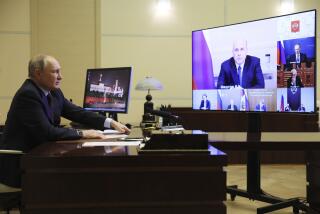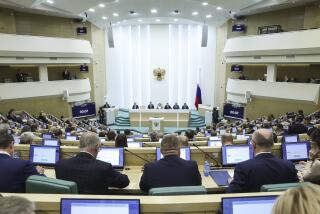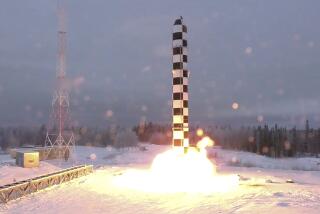An Extremely Safe Bet : Little is at risk with a ban on underground nuclear testing
- Share via
Sen. Sam Nunn (D-Ga.), chairman of the Senate Armed Services Committee, is no dove, but Nunn is urging a phaseout of U.S. underground nuclear testing. Now President Bush, who had said he would veto a ban, has dropped the threat. It’s a welcome change of heart, election-year politics aside.
In August the Senate voted 68 to 26 to impose a nine-month moratorium (starting next month) on such tests. Stringent conditions were placed on all subsequent tests, and tests were to be halted completely after Oct. 1, 1996.
Inspiration for the testing moratorium and phaseout was the unilateral testing moratorium declared by Russian President Boris N. Yeltsin. And if Russia’s moratorium can be attributed to a weak economy, an identical moratorium in far more prosperous France is harder to dismiss.
The ban exists as an add-on to a $22-billion energy and spending bill, which includes $8 billion for a superconducting supercollider. The supercollider is important to Texas, and Texas is important to the President’s reelection.
Opponents of the ban succeeded in adding a condition: If other countries resume underground testing, the United States may do so as well. But this is, by and large, face-saving. If others’ tests ever constituted a threat, there is no doubt that Washington would resume the program.
Nuclear testing advocates argue that tests are necessary for various technical reasons, such as safety and the integrity of the nuclear material. The main point at issue between Sen. Nunn and President Bush is whether continuous testing is necessary to keep U.S. weapons (and the personnel in charge of them) in good working order.
Opponents of testing, such as Nunn, have come to believe that a halt would jeopardize neither the weapons nor the personnel, while sparing the nation the cost--and sparing the environment the damage--that testing entails.
Moscow has offered the West something close to ultimate nuclear disarmament: a selloff of the uranium in the stockpiled Soviet warheads. There--rather than on testing--is where U.S. defense money should now be spent.
More to Read
Sign up for Essential California
The most important California stories and recommendations in your inbox every morning.
You may occasionally receive promotional content from the Los Angeles Times.













